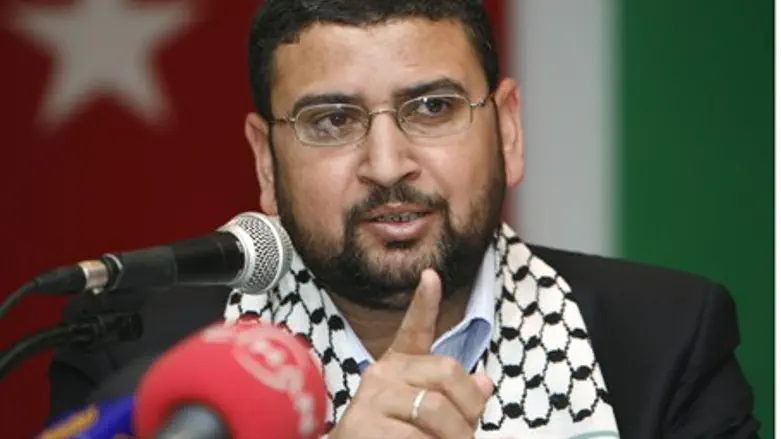
Palestinian Authority (PA) Chairman Mahmoud Abbas’s suggestion that NATO forces be deployed in the future Palestinian state is not well-received by his rivals, the Hamas rulers of Gaza.
A spokesman for Hamas said Friday that the faction would regard any international military presence within a future Palestinian state as "occupation" forces, reported the Ma’an news agency.
During a rally in southern Gaza, spokesman Sami Abu Zuhri said that any international forces stationed in “Palestine” as a result of a peace agreement with Israel would be treated the same as “the Israeli occupation.”
Abu Zuhri called on Abbas to withdraw from negotiations with the United States and Israel, saying the talks only served to "terminate the question of Palestine and what is left of Palestinian rights and principles."
"Nobody has authorized you (Abbas) to speak on behalf of the Palestinian people, or on behalf of Hamas or any other faction," he said, according to Ma’an.
"Why don't you tell the truth about what is going on in the secret negotiations? If you are honest, go out to your people and tell the truth and give them details."
Abu Zuhri urged all factions to oppose the ongoing peace talks and any emerging agreement, saying that after decades of on-and-off talks, negotiations have proved a "mirage."
Abbas’s suggestion was made in a recent interview with the New York Times. In that interview, he said he would agree to let Israeli troops remain in the Palestinian state for a transitional period of five years.
After the five-year transitional period, Abbas said, the Israeli forces could be replaced indefinitely by an American-led NATO force, with troops throughout the territory, at every crossing and within Arab eastern Jerusalem, along with Palestinian Arab police and security units.
The NATO forces could stay “for a long time, and wherever they want, not only on the eastern borders but also on the western borders, everywhere ... For a long time, for the time they wish. NATO can be everywhere, why not?” said Abbas.
The issue of the Jordan Valley has become a point of contention in the talks between Israel and the PA, which insists on full control of the Jordan Valley – along with all other land that was under Jordanian control from 1948 to 1967. Israeli experts have warned that the area is strategically critical.
U.S. Secretary of State John Kerry said last week that Prime Minister Binyamin Netanyahu opposes the idea that NATO forces will secure Israel's borders in the event of a withdrawal from Judea and Samaria.
However, he stated that the possibility of a third-party being tasked with Israel's security still "is something for the parties to work out."
One of the PA’s long-standing preconditions for peace is an Israeli withdrawal to the borders that existed before the 1967 Six Day War. Withdrawing to these borders, which former Foreign Minister Abba Eban referred to as the “Auschwitz borders”, would place central Israel, including the Ben Gurion Airport, under the threat of missiles and would guarantee Israel’s destruction.
Hamas, which has been at odds with Abbas’s Fatah faction since 2007, has never been supportive of peace talks to begin with.
As the talks restarted, the movement stated they were "futile" and “purely a means for the occupation (Israel) to look good to the international community.”
Hamas has also pointed out that "whoever negotiates on the part of the people who is not chosen by them, represents only himself. The Palestinian people will not accept this."
Abbas’s term as PA Chairman officially ended more than four years ago, but he continues in his role despite no one having given him the mandate to do so. The PA parliament which was elected for a four-year term in 2005 has yet to be dissolved, despite the fact that nearly two terms have already passed since its election.
